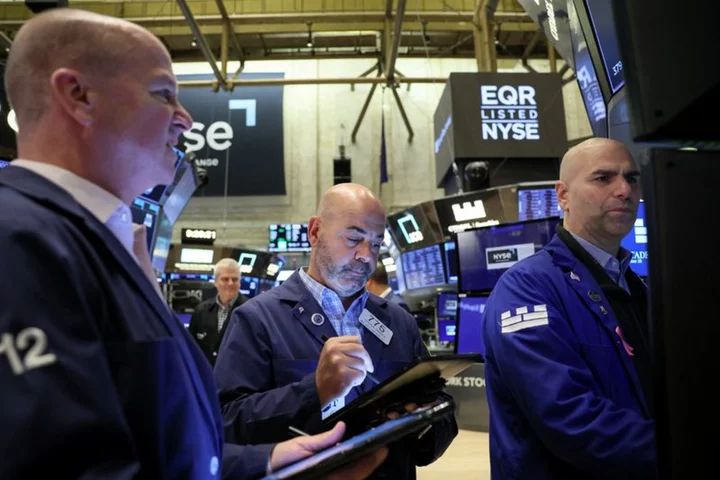Escalating tension in the Middle East and surging U.S. bond yields set financial markets up for more turbulence, exacerbated by high oil prices and China's property pain.
The European Central Bank looks set to sit tight after a string of interest rate hikes, while there's a slew of U.S. earnings and Argentina's presidential election.
Here's your week ahead in markets from Amanda Cooper and Naomi Rovnick in London, Kevin Buckland in Tokyo, and Lewis Krauskopf and Rodrigo Campos in New York.
1/ UNEASY CALM
War is raging between Israel and Palestinian militant group Hamas and an uneasy calm grips markets as they wait and see how the conflict unfolds.
Market reaction has been relatively modest with Wall Street's so-called fear gauge, the VIX index, showing investors are not as nervous as they were when Russia invaded Ukraine last year - at least, not yet.
Oil is the barometer to watch. It hit $93 a barrel on Wednesday as the risk of escalation threatened to disrupt Middle East oil supplies.
A wider conflict would deliver another shock to markets, potentially forcing the hand of central banks that have been unswerving in their determination to fight inflation.
The "flash" manufacturing and service sector activity surveys in coming days could add to uncertainty if they point to economic weakness.
2/ STOPPING HERE?
The European Central Bank, meeting on Thursday, will likely have one eye on the potential for conflict in the Middle East to disrupt dis-inflationary trends and the other on a weakening economy.
Hopes for rate cuts would be premature. ECB chief economist Philip Lane says the central bank was still "quite some distance" from easing monetary policy.
But traders can expect, at least, a pause for now.
After the ECB raised its deposit rate at each of its last 10 meetings to a current record high, policymakers have signaled it is time to keep borrowing costs on hold as they assess the impact of monetary tightening so far.
Canada's central bank, meeting on Wednesday, is tipped to leave rates steady as inflation eases.
3/ CUE THE MEGACAPS
Reports from megacap companies highlight a big batch of third quarter U.S. corporate earnings, a key test for stocks that have propelled equity indexes higher this year.
Microsoft and Alphabet results are due on Tuesday, Meta Platforms, on Wednesday, and Amazon on Thursday. Those stocks along with Apple, Nvidia and Tesla combined have accounted for the bulk of the S&P 500's 11% year-to-date gain, so any results disappointment could have broad fallout.
Others reporting in the coming week include Coca-Cola, General Motors, Merck and United Parcel Service. Investors are banking on an overall recovery in U.S. profits after a tepid first half.
Markets also get a fresh look at the state of the economy from data including third-quarter GDP and the monthly personal consumption expenditures price index.
4/ WEEDS VS GREEN SHOOTS
Signs of green shoots for China's economy after upbeat retail sales, factory production and GDP data are hard to spot as the weeds in the property sector get thicker.
Making up a quarter of the world's No. 2 economy, property turmoil threatens China's 5% growth target - even after a consensus-smashing 4.9% quarterly expansion.
That hasn't escaped investors, who pushed mainland shares to a nearly one-year trough.
A lot of what's happening is hidden from view: A default deadline for Country Garden's debt passed in silence, and the property developer was forced to deny its founder and his daughter had fled China. The market is scouring the landscape for who's next, and the sudden resignation of Gemdale's chairman, for unspecified health reasons, spurred a fire sale of its bonds.
Pressure on Beijing for further stimulus is strong and steps so far have disappointed.
5/ CROSSROAD FOR ARGENTINA
Stewardship of Argentina's $600 billion economy will be on the line on Sunday, when voters decide between libertarian populist Javier Milei, center-left and current economy minister Sergio Massa, and center-right ex-minister Patricia Bullrich.
Latin America's third largest economy is engulfed by a severe economic crisis - inflation runs at 138% and is on the verge of going hyper, interest rates stand at 133% and the black-market peso has weakened more than 60% this year alone.
For investors, the survival of the country's $43 billion program with the International Monetary Fund is at stake, as well as the possibility of Argentina defaulting on its debt for the tenth time.
Milei, surprise victor in the August primary election, has pledged to dollarise the economy and get rid of the central bank. He continues to lead most polls, which also show the likely need for a November runoff between him and Massa.
(Graphics by Vineet Sachdev, Pasir Kongkunakornkul and Sumanta Sen; Compiled by Dhara Ranasinghe; Editing by Simon Cameron-Moore)

